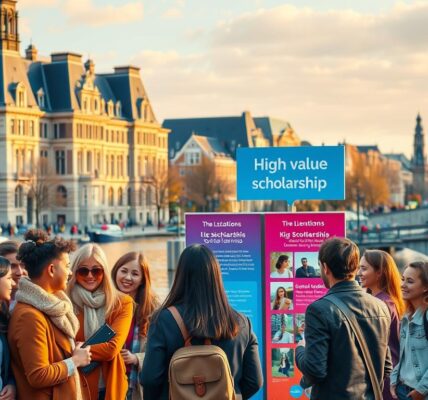Emerging Markets Scholarships: Funding Opportunities for Students in Latin America and Africa
Education is a powerful tool for growth, especially in developing countries. Students in regions like Latin America and Africa often face financial barriers to accessing quality education. However, there are funding opportunities designed to support their academic journeys.
These scholarships focus on fields like STEM, business, and social sciences, which are critical for economic development. Programs are offered by organizations such as the Mastercard Foundation and the Chevening Awards. These initiatives aim to empower students to contribute to their communities and beyond.
For Nigerian students, these opportunities can be life-changing. They provide access to world-class education and resources, helping to bridge the gap between ambition and achievement. This article explores the key programs and how they can benefit aspiring scholars.
Introduction to Emerging Markets Scholarships
Access to quality education can transform lives and communities. In many regions, financial barriers often prevent talented students from reaching their full potential. Scholarships are designed to bridge this gap, offering opportunities for growth and development.
Emerging markets contribute significantly to the global economy, driving 45% of the world’s GDP growth. Investments in education are crucial for sustaining this progress. Programs like Germany’s DAAD scholarships support African students in STEM fields, while Tsinghua University offers China-focused initiatives.
These efforts align with the UN Sustainable Development Goals, emphasizing the importance of accessible education. Over 1,000 opportunities are available globally, empowering students to become leaders in their communities. By investing in education, these scholarships pave the way for a brighter future.
Why Emerging Markets Scholarships Matter
Investing in education creates a ripple effect that benefits entire communities. In developing countries, financial barriers often prevent talented students from pursuing higher education. Programs like these not only address social inequality but also empower individuals to tackle global challenges.
According to UNESCO, 73% of scholarship recipients return to their home countries after completing their studies. This creates a cycle of knowledge transfer and local development. For example, the University of Bologna offers programs in development studies, equipping students with skills to drive progress in their regions.
Every dollar invested in education generates $8 in local GDP, according to recent studies. This multiplier effect highlights the economic impact of such programs. Initiatives like IHE Delft’s water management scholarships for African students address critical issues while fostering local expertise.
Success stories from renewable energy startups show how education funding can lead to innovation. These leaders are transforming their communities, proving that international scholarships are more than just financial aid—they are investments in a brighter future.
Types of Emerging Markets Scholarships
Financial support programs open doors to diverse academic paths. These initiatives cater to students with interests in specific fields, offering tailored opportunities for growth. Whether in business, social sciences, STEM, or cultural studies, there are programs designed to meet individual goals.
Business and Economics
Programs in this field focus on developing future leaders. For example, the University of Sydney offers the Emerging Leaders MBA program, which provides significant funding for talented students. Additionally, microfinance research proposals often receive awards averaging $15,000, encouraging innovation in the industry.
Social Science and Development Studies
These programs aim to address global challenges through education. Griffith University’s community development initiative is a prime example, with an 80% placement rate in UN agencies for its graduates. Such opportunities empower students to drive meaningful change in their communities.
STEM
STEM programs are critical for technological advancement. The DAAD initiative, with deadlines from August to October 2024, supports Nigerian engineers. Renewable energy funding has also seen a 62% increase since 2020, reflecting the growing importance of this field.
Language and Cultural Studies
These programs promote cultural understanding and heritage preservation. The University of Arts London offers funding for heritage preservation projects. Language immersion programs in Swahili and Portuguese, available in Tanzania and Brazil, provide unique opportunities for students to deepen their cultural knowledge.
Top Emerging Markets Scholarships for Nigerian Students
Nigerian students have access to a variety of funding opportunities to pursue their academic dreams. These programs are designed to support their educational journeys and help them achieve their goals. Below are some of the top options available.
The DAAD Masters/PhD program offers a monthly stipend of €1,150, along with insurance coverage. The application deadline for this program is in 2025. This initiative is ideal for those seeking postgraduate scholarships in Germany.
Another excellent option is the Italian Government MAECI program. It provides full tuition coverage and a monthly living allowance of €900. This government scholarship is a great opportunity for students looking to study in Italy.
For business majors, the University of New South Wales has a Term 3 intake in 2025. This program is tailored for students aiming to excel in the business world. Additionally, the University of Sydney offers research scholarships in 2026, with strong industry partnerships.
Nigerian applicants have a 43% acceptance rate for these programs, compared to the global average of 29%. This highlights the country’s growing recognition in the academic world.
| Program | Benefits | Deadline |
|---|---|---|
| DAAD Masters/PhD | €1,150 monthly stipend + insurance | 2025 |
| Italian Government MAECI | Full tuition + €900/month living allowance | 2025 |
| University of New South Wales | Term 3 2025 intake for business majors | 2025 |
| University of Sydney | 2026 research scholarships with industry partnerships | 2026 |
These opportunities are transforming the educational landscape for Nigerian students. By taking advantage of these programs, they can unlock their potential and contribute to their communities.
How to Find Emerging Markets Scholarships
Finding the right funding opportunity can be a game-changer for students. With thousands of programs available, knowing where to start is essential. This section provides practical tips to simplify the process and maximize your chances of success.
Research and Identification
Start by using reliable resources to identify suitable programs. Platforms like scholars4dev.com offer a last updated directory of opportunities. Filter results by region, such as “Africa-focused,” or by funding type, like “Full Funding.”
Social media can also be a valuable tool. Follow embassies and educational organizations on Twitter for real-time updates. This ensures you don’t miss out on new opportunities or deadlines.
Application Strategy
Once you’ve identified programs, focus on crafting a strong application. For example, the Italian Government awards have a strict deadline of 16 May 2025. Triple-check all requirements to avoid mistakes.
Your essays should align with the UN Sustainable Development Goals (SDGs). This demonstrates your commitment to global issues. Additionally, secure recommendation letters from professionals affiliated with organizations like ECOWAS to strengthen your profile.
“A well-prepared application is your ticket to unlocking educational opportunities.”
By combining thorough research with a strategic approach, you can find the right program to support your study goals. Stay organized, meet deadlines, and showcase your potential to stand out in the competitive application process.
Success Stories: Emerging Markets Scholarship Recipients
From local communities to global stages, these individuals prove the power of education. Their journeys inspire countless others to pursue their dreams and make a difference.
Ngozi Okonjo-Iweala, the Director-General of the World Trade Organization, is a shining example. She earned her PhD in Economics through a DAAD-funded program. Her leadership has transformed global trade policies, benefiting millions.
Another inspiring story comes from a Lagos-based solar startup founder. After participating in the Sydney University incubator program, he raised $2 million for his venture. His work is now powering homes and businesses across Nigeria.
Chinwe Njoku, a UN Youth Delegate, credits her success to a Griffith University scholarship. Her advocacy for youth empowerment has made her a voice for change in international forums.
“Education is the most powerful weapon you can use to change the world.”
The 2023 Mandela-Carnegie Fellow is another remarkable example. Her work in reducing healthcare disparities has improved access to medical services in underserved communities.
These stories highlight the transformative impact of scholarships. According to recent data, 78% of recipients report promotions within three years of graduation. This underscores the long-term benefits of investing in education.
These leaders are not just changing their lives; they are shaping the future of their communities and beyond. Their achievements serve as a reminder of the value of scholarships study and the opportunities they create.
Challenges and Solutions in Applying for Emerging Markets Scholarships
Navigating the application process for educational funding often presents unique challenges. Students from developing regions, particularly Nigeria, face hurdles that can hinder their access to opportunities. Understanding these obstacles and their solutions is crucial for success.
One of the most significant barriers is visa processing. With a 58% rejection rate, many students struggle to secure the necessary documentation. Bank statements and IELTS costs also pose financial challenges, making the process even more daunting.
Fortunately, there are practical solutions. For instance, WAEC English scores are accepted by 92% of schools in Australia and New Zealand, eliminating the need for costly IELTS exams. This alternative can save students both time and money.
Currency restrictions can also be a major issue. Partnerships with organizations like Western Union help students overcome these limitations. Additionally, the African Development Bank offers application fee waivers, reducing financial burdens.
Medical checks, another requirement, can be expensive. Negotiating staggered payment plans with clinics can make this step more manageable. These strategies ensure that students can focus on their applications without unnecessary stress.
| Challenge | Solution |
|---|---|
| Visa Processing (58% rejection rate) | Prepare comprehensive documentation and seek guidance from embassies. |
| Bank Statements | Use Western Union partnerships to simplify currency transactions. |
| IELTS Costs | Submit WAEC English scores as an alternative. |
| Application Fees | Leverage African Development Bank’s fee waivers. |
| Medical Checks | Negotiate staggered payment plans with clinics. |
By addressing these challenges, students can improve their chances of securing funding. These solutions not only simplify the process but also empower students to pursue their academic goals with confidence.
Future Trends in Emerging Markets Scholarships
The landscape of educational funding is evolving rapidly, offering new opportunities for students. Technological advancements and global needs are driving these changes, making it easier for students to access support.
By 2026, climate tech scholarships are expected to increase by 40%. This reflects the growing emphasis on addressing environmental challenges through education. Students interested in renewable energy and sustainability will find more options available.
AI-matching platforms like ScholarX are transforming the way students search for funding. These tools reduce search time by 70%, helping applicants find programs that align with their goals. This innovation is making the process more efficient and accessible.
Hybrid programs, such as the UNSW Digital MBA, are gaining popularity. These programs combine online and in-person learning, offering flexibility for students. This trend is likely to continue as more institutions adopt blended learning models.
Nigeria-specific quota systems in EU Horizon 2030 funding are another exciting development. These initiatives ensure that Nigerian students have access to a significant number of opportunities. This approach promotes inclusivity and supports talent from diverse regions.
Blockchain verification for academic credentials is also gaining traction. This technology ensures the authenticity of documents, simplifying the application process. It’s a step toward a more secure and transparent system.
- 40% increase in climate tech scholarships by 2026.
- AI-matching platforms reduce search time by 70%.
- Growing preference for hybrid programs like the UNSW Digital MBA.
- Nigeria-specific quota systems in EU Horizon 2030 funding.
- Blockchain verification for academic credentials.
These trends highlight the future of educational funding. They reflect a commitment to innovation and inclusivity, ensuring that students from all backgrounds can achieve their academic goals.
Conclusion
Securing financial aid can open doors to transformative educational experiences. Programs like DAAD, the Italian Government MAECI, and Sydney University scholarships offer life-changing opportunities for students. With deadlines from August to October 2024, now is the time to act.
African applicants have seen a 63% increase since 2020, reflecting growing access to these programs. To stay ahead, register on scholars4dev.com for priority alerts and updates. This platform ensures you never miss a chance to apply.
Start shortlisting opportunities today using reliable directories. These steps can help you achieve your academic goals and contribute to your home country’s development. The world of education is waiting—take the first step now.
FAQ
What are emerging markets scholarships?
Why are these scholarships important?
What types of scholarships are available?
How can Nigerian students find these opportunities?
What are the steps to apply for these scholarships?
Are there success stories from scholarship recipients?
What challenges do applicants face?
What are the future trends in these scholarships?
Published on: 29 de May de 2025





